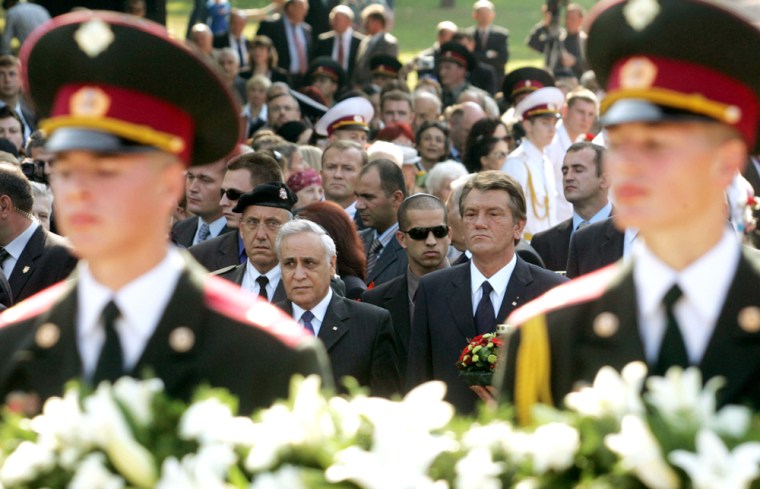Bells gently tolled as Ukrainian and foreign dignitaries on Wednesday commemorated the 65th anniversary of the Nazi massacre of Jews at the Babi Yar ravine, placing flower-encircled candles at the foot of a giant monument to the tens of thousands of victims.
Ukrainian President Viktor Yushchenko and Israeli President Moshe Katsav led the solemn procession behind an honor guard of Ukrainian soldiers carrying a garland of white flowers.
Hundreds of mourners — many Jews who had traveled from around the world — watched, clutching their own offerings of red and white carnations. Some carried small stones, which Jews traditionally leave at grave sites as a sign of respect.
“For me, it is not just memories,” said Dina Maydanyk, 74, whose three brothers died in the Holocaust. “It’s a horror.”
After a minute of silence, representatives of different religions — Jewish, Ukrainian Orthodox — led the crowd in mournful prayers.
“The scope of this tragedy cannot be measured by dry statistical numbers. I want us to see the human face behind every number and I want us to see ourselves and as a whole all the human civilization that was put under machine-gun fire,” Yushchenko said Wednesday as he opened the forum “Let My People Live”, dedicated to the victims of the tragedy.
Remembering the day
The massacre began on Sept. 29, 1941, when Soviet Kiev’s Nazi occupiers ordered all Jews to report to a ravine on the outskirts of town.
The Jews thought they would be taken to a ghetto, and Kiev residents recalled their Jewish neighbors lugging their most valuable belongings out to the ravine.
But when they got there, the Jews were forced to undress and gather in lines along the ravine’s steep embankment. There, the Nazis machine-gunned down the crowd, killing at least 33,771 over 48 hours. In the ensuing months, the number of people killed at Babi Yar grew to more than 100,000.
“I saw how the Germans were laughing and joking when they looked at the people they were bringing to their death,” said Nina Isayeva, 82, who came to pay tribute to the victims. “What barbarians they were.”
Moshe Kantor, founder of the World Holocaust Forum that is organizing the events, said the world’s silence after Babi Yar emboldened the Nazis to embark on their “final solution” of death camps that ultimately killed 6 million European Jews.
“We must be carriers of these stories,” Kantor said.
The exact death toll at Babi Yar remains unknown. The Nazi executioners recorded the number of Jews killed in the first two days, but there are no exact records of subsequent killings. In 1943, as the Red Army approached to free Ukraine, the Nazis ordered Jewish prisoners to dig up the corpses and burn them.
Zhenya Kazachenko, 37, whose relatives died at Babi Yar, said simply: “Never again.”
No memorial for years
For decades, the Soviets maintained silence about what happened in Babi Yar. Only after Russian poet Yevgeny Yevtushenko drew international attention to the massacre with his 1961 poem “Babi Yar,” did the Soviets put up a towering monument of twisted and tormented figures. It made no mention of Jews, however. It wasn’t until 1991, as the Soviet Union began to crumble, that Jews were allowed to erect a menorah candle holder near another part of the ravine.
Today, the ravine is part of a popular park, and Jewish leaders say they are frustrated that children still play soccer and couples picnic where tens of thousands were massacred.
Wednesday’s commemorations were held at the Soviet memorial. The Jewish community held an earlier private ceremony at the large menorah in the park.
Ukraine was once home to a thriving Jewish community; about 20 percent of Kiev’s population of 875,000 was Jewish before the war. Today, Ukraine has about 103,000 Jews, according to official data, although the number is believed to be several times higher.
Ukraine’s Jewish community has grown increasingly frustrated by manifestations of anti-Semitism. Last year, Jews faced a series of attacks near a downtown synagogue, and anti-Semitic books and literature continue to be sold openly in some kiosks around Kiev.
“It is important to remember what happened,” said Ronald Stanton, 78, who came to the commemorations from New York City. “People forget very quickly.”
